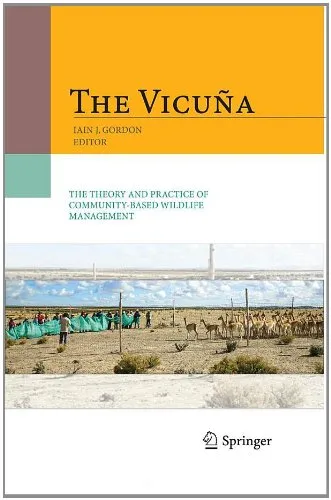The Vicuna: The Theory and Practice of Community Based Wildlife Management
4.0
Reviews from our users

You Can Ask your questions from this book's AI after Login
Each download or ask from book AI costs 2 points. To earn more free points, please visit the Points Guide Page and complete some valuable actions.Related Refrences:
Introduction to The Vicuna: The Theory and Practice of Community Based Wildlife Management
The Vicuna: The Theory and Practice of Community Based Wildlife Management explores the delicate balance between wildlife conservation and human development, centering on the vicuna, a camelid native to the high Andes. By shedding light on this unique animal, the book provides insights into community-based wildlife management (CBWM) and its potential role in sustainable development.
Detailed Summary of the Book
The book encapsulates a comprehensive analysis of the vicuna’s ecology, socio-economic importance, and integration into local and international conservation frameworks. It begins by delving into the biology of the vicuna, explaining its significance not only as a species but also as a symbol of the conservation movement in the Andean region. Historical factors that led to its near extinction are carefully examined, as well as the current measures that have been successful in its recovery.
Central to the book is the concept of community-based wildlife management (CBWM), which is presented as a collaborative approach involving local communities to ensure sustainable wildlife utilization. Case studies abound in describing how various communities across South America have adopted this model. The economic calculus of vicuna fiber trade is scrutinized, showcasing a pathway for local empowerment while safeguarding wildlife conservation. The interconnectedness of traditional practices and modern conservation strategies is portrayed, illustrating a unique synergy necessary for the vicuna's ongoing survival.
The narrative progresses to discuss the practical challenges and successes of implementing CBWM, providing illustrative examples of stakeholder engagement and conflict resolution. Additionally, the book raises poignant questions about the changing global landscape and its implications for both local communities and wildlife management policies, making it an essential resource for policymakers, conservationists, and community leaders.
Key Takeaways
- Understanding the role of the vicuna in ecological and socio-economic contexts provides a broader perspective on wildlife conservation.
- Community-based wildlife management is a viable model for achieving both ecological sustainability and economic growth in rural communities.
- Successful wildlife management requires the integration of local knowledge, stakeholder cooperation, and international conservation efforts.
- Continuous adaptation and learning are necessary to address the dynamic challenges faced in wildlife conservation.
Famous Quotes from the Book
"Conservation does not exist in isolation but thrives where people see value in preserving the natural world."
"When people and wildlife are viewed as allies rather than adversaries, true progress is made."
Why This Book Matters
The Vicuna: The Theory and Practice of Community Based Wildlife Management stands as an important contribution to the discourse on sustainability and wildlife management. As the pressures of climate change and human expansion increase, this book highlights the importance of integrative and inclusive management strategies. It champions the engagement and empowerment of local communities as pivotal to the conservation of biodiversity and the preservation of cultural heritage in the Andes and beyond.
By focusing on the vicuna, the book also addresses broader issues of animal conservation, highlighting the complexity and necessity of balancing human livelihoods with ecological protection. As such, it serves as a critical guide for academics, practitioners, and policymakers dedicated to advancing sustainable development goals through innovative management practices.
Free Direct Download
You Can Download this book after Login
Accessing books through legal platforms and public libraries not only supports the rights of authors and publishers but also contributes to the sustainability of reading culture. Before downloading, please take a moment to consider these options.
Find this book on other platforms:
WorldCat helps you find books in libraries worldwide.
See ratings, reviews, and discussions on Goodreads.
Find and buy rare or used books on AbeBooks.
1562
بازدید4.0
امتیاز0
نظر98%
رضایتReviews:
4.0
Based on 0 users review
Questions & Answers
Ask questions about this book or help others by answering
No questions yet. Be the first to ask!














